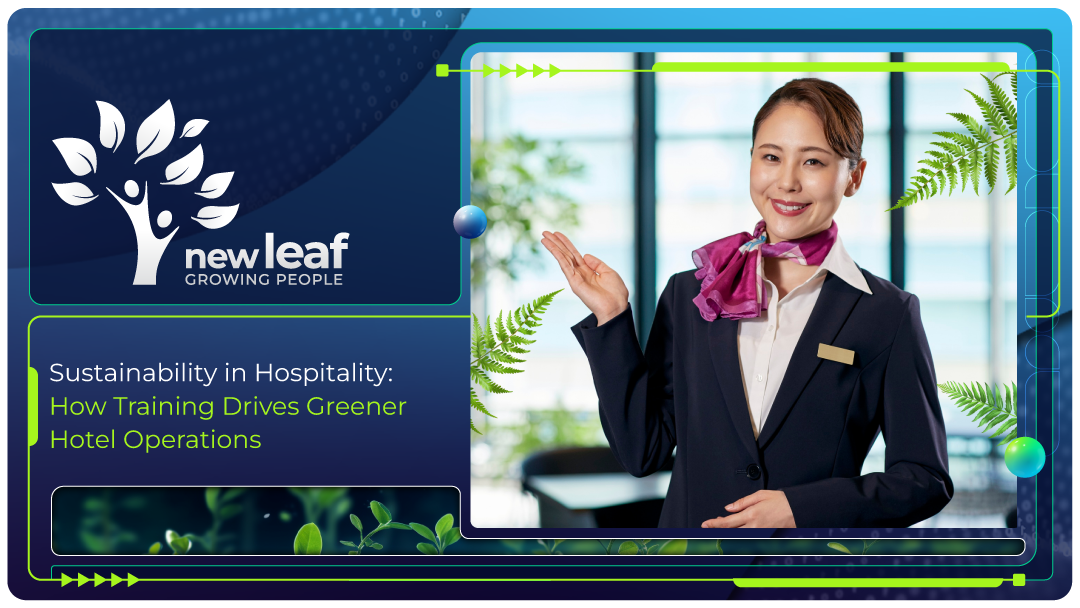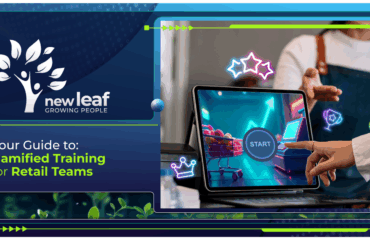
The hospitality industry faces growing pressure to prove its sustainability. Eco-conscious guests, stricter regulations, and rising costs make green practices and certifications essential for attracting customers and boosting profitability.
According to the UN World Tourism Organization’s Tourism Sustainability Report 2023, 73% of global tourists prefer to stay in hotels that apply sustainable practices. This shift in consumer preferences is transforming the hotel industry.
Yet while many hotels publish ambitious green targets, too often these remain aspirations on paper. The real challenge is training staff to turn strategy into action. That’s where New Leaf Technologies comes in. We provide the hospitality industry with smart, scalable training solutions that transform sustainability from a goal into a daily reality.
Key Takeaways
- Greener hotel operations are non-negotiable: Guest expectations, regulations, and competition mean hotels must embed green practices at every level.
- Training closes the gap: Staff need clear guidance and skills to translate policies into daily actions.
- Culture change starts with learning: Ongoing eLearning ensures that sustainability becomes a lived value, not a short-term campaign.
Why Sustainability Is No Longer Optional in Hospitality
Sustainability is no longer a “nice-to-have” in the hospitality sector; it’s a business imperative. Hotels that ignore sustainability risk reputational damage, higher operating costs, and lost opportunities in a market where eco-leadership is becoming a marker of quality.
These are the most pressing sustainability issues hotels and resorts are facing right now:
- Evolving traveller profiles: As the World Economic Forum’s 2025 report Travel and Tourism at a Turning Point notes, the rise of middle-class travellers from emerging markets such as India and China, alongside eco-conscious Millennials and Gen Z, is reshaping demand. These groups increasingly prioritise sustainable options when choosing where to stay.
- Environmental and social challenges: The hospitality sector contributes significantly to global emissions, resource consumption, and waste generation. The World Tourism Organization (UN Tourism) stresses the need to align with global sustainable development goals, while the WEF calls for regenerative practices that not only mitigate harm but also actively restore ecosystems.
- Guest expectations: Modern travellers expect transparency and action. From reduced single-use plastics to visible green certifications, eco-friendly hotel operations are now a baseline for guest satisfaction.
- Regulatory requirements: Governments are tightening sustainability standards, introducing measures such as stricter building codes, energy efficiency mandates, and waste regulations. Waste management remains a growing challenge. The WEF projects that tourist-generated waste could reach 205 million tonnes annually by 2034 if no systemic changes are made.
- Competitive positioning and workforce development: Sustainability credentials have become a brand differentiator, attracting not only guests but also employees and investors. With labour shortages already straining the hospitality sector, the WEF emphasises the need to upskill staff in sustainable hospitality management to ensure long-term viability.
The Gap Between Sustainability Goals and Staff Practice
Many hospitality companies proudly publish sustainability pledges, yet these commitments often fail to translate into daily operations. The issue lies not in strategy but in execution. Policies won’t make it off the paper if frontline staff don’t understand why they matter or how to apply them.
For example, a hotel may set ambitious goals for energy reduction, but if housekeepers don’t know how to optimise lighting and air-conditioning while servicing the rooms, the hotel won’t reach those targets. Similarly, staff may be unaware of waste sorting protocols or unsure how to engage guests in eco-friendly practices.
The gap between policy and practice is primarily a training gap. The WEF highlights workforce development as a critical priority, urging industry leaders to develop educational initiatives and utilise digital training to implement large-scale learning.
This reinforces the point: Unless staff are trained to act on sustainability policies, even the most ambitious goals will remain out of reach.
How Training Turns Strategy Into Action
Training that provides flexible, accessible eLearning for green practices is the bridge between sustainability vision and on-the-ground reality. By embedding sustainability modules into staff development programs, hotels can:
- Ensure that employees understand why sustainability matters, not just what to do.
- Build role-specific skills, from front-of-house teams engaging guests in green initiatives to kitchen staff managing food waste.
- Standardise practices across properties for consistent execution of corporate sustainability goals.
Technological innovation plays a dual role here. AI and advanced connectivity are transforming travel, underscoring the need for robust ethical frameworks. In the context of training, AI-powered eLearning platforms can personalise sustainability modules for different staff roles, track progress in real time, and ensure that global standards are met without compromising local relevance.
As Deloitte’s hospitality sustainability analysis stresses, staff engagement is vital for embedding sustainable practices at every level of an organisation. New Leaf’s training solutions ensure that engagement is continuous, measurable, and scalable.
Key Areas Where Training Supports Greener Operations
Sustainability in hospitality is the practice of operating hotels and related services in a way that:
- Minimises environmental impact.
- Conserves natural resources.
- Supports local communities.
- Promotes social responsibility.
- Maintains high-quality guest experiences.
That’s why training is so important. Here are the areas L&D (learning & development) practitioners should focus on:
Energy and Water Efficiency
Staff can learn how to identify and reduce unnecessary consumption by switching off idle equipment and promptly reporting leaks. These micro-actions directly address the environmental footprint concerns flagged by both the WEF and UN Tourism.
Waste Reduction and Recycling
Training helps employees correctly separate waste streams, reduce food waste, and eliminate unnecessary disposables. This creates both cost efficiencies and environmental benefits.
Responsible Sourcing and Supplier Choices
The WEF emphasises the importance of supporting SMEs and local capacity-building. Training procurement teams to prioritise local, ethical, and sustainable suppliers strengthens community ties while reducing carbon-heavy logistics.
Guest Engagement in Sustainable Practices
Frontline staff trained in positive guest communication can inspire eco-conscious behaviours without diminishing guest experience. These include encouraging digital check-in, minimising food waste at buffets, and promoting towel and linen reuse. This aligns directly with the evolving expectations of Millennials and Gen Z, groups that are shaping future travel demand.

Embedding Sustainability Into Hotel Culture
One-off campaigns or single training sessions won’t embed sustainability. Cultural change requires consistent reinforcement. By integrating sustainability into ongoing training, hotels send a clear message: Sustainability is not a trend but a core organisational value.
When staff at every level understand their role, sustainability becomes second nature, influencing daily decisions, inspiring innovation, and strengthening brand identity. The World Travel & Tourism Council (WTTC) emphasises that sustainability should be viewed as a long-term investment in resilience, rather than a box-ticking exercise.
Case Examples: Hotel Groups Embracing Green Training
Over 5,000 hotels across more than 80 countries have embraced the World Travel & Tourism Council’s (WTTC) Hotel Sustainability Basics program, marking a significant milestone in the industry’s commitment to sustainability.
Here is how some well-known hotels are embracing green training:
City Lodge Hotel Group
- Embedded sustainability into daily operations with initiatives like water-saving, farm-to-table dining, waste management, and energy efficiency.
- Prioritises staff training, including learnerships, so employees understand why initiatives matter, not just how to follow procedures.
- Demonstrates how aligning people and policy turns sustainability from compliance into culture.
IHG Hotels & Resorts
- Runs the Green Engage initiative, requiring all hotels to meet sustainability standards starting with Level 1 (basic actions + staff training for sustainability).
- Certification system drives continuous improvement, supported by employee training on waste reduction, energy, and sourcing.
- Invests in skills training and job programmes through its “Journey to Tomorrow” plan, strengthening workforce sustainability alongside environmental goals.
Hilton Hotels & Resorts
- Provides employees with an average of 40 hours of training per year, including content related to sustainability.
- Uses Hilton University and its Lead@Hilton framework to ensure that staff and leaders integrate sustainability into operations and management.
- Embeds training into leadership pathways, reinforcing that sustainability is a business priority, not a siloed initiative.
Accor Hotels Group
- Introduced the School for Change, a global training initiative that educates all employees on climate change, biodiversity, and social impact.
- Provides masterclasses tailored to specific departments, ensuring practical application of sustainability knowledge.
- Links training outcomes to KPIs and even leadership bonuses, driving accountability from top to bottom.
Build a Greener Future Through Smarter Training
The hospitality sector stands at a crossroads. With global travel rebounding and new generations of travellers demanding sustainability, hotels cannot afford to rely on good intentions alone. Real change requires informed and empowered staff who know how to implement sustainable practices in their day-to-day roles.
New Leaf Technologies designs eLearning programs that empower hotel teams to integrate greener habits into their daily operations, reducing costs and enhancing brand reputation.
Sustainability isn’t just about minimising impact, it’s about building regenerative systems that benefit people, communities, and the planet. Isn’t it time your training strategy reflected that?
Contact us today to discuss building a sustainable culture in your hotel.
FAQs
H3: How can eLearning help hotels embed sustainability into their culture?
Cultural change requires consistency and reinforcement. eLearning allows hotels to deliver ongoing, role-specific hotel sustainability training at scale, ensuring that staff internalise eco-friendly habits. Programs can be updated regularly, progress tracked, and measurable outcomes provided.
How can we ensure that staff actually engage with sustainability training?
Engagement is highest when training is interactive, role-specific, and easy to access. Modules that include real-life scenarios, quizzes, and progress tracking motivate staff to apply what they learn on the job. Our solutions combine practical exercises with ongoing reinforcement, helping sustainability concepts become habitual rather than theoretical.
How do we secure leadership buy-in for sustainability-focused training?
Leadership support grows when training aligns with strategic goals, demonstrates measurable impact, and enhances brand reputation. By providing data on cost savings, guest satisfaction, and compliance improvements, L&D managers can make a strong business case. New Leaf Technologies offers reporting tools and analytics to help leadership see the direct benefits of investing in sustainability training.




